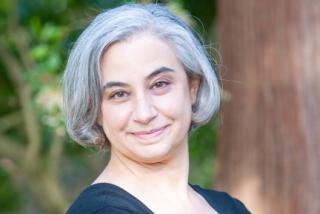President Bush Is Right--the World Is Full of Gracie Annes
She is sitting in my lap as I write. Her legs are scissored around my waist and she has an arm hooked around my neck. She is a little girl in a cookie-crumb T-shirt and a fat diaper. And she is hanging on because she needs nothing so much as to be held.
This is a toddler who didn’t know much about the bonds of love. She spent her first 21 months in a shoestring orphanage where babies were packed two to a crib, almost wall-to-wall. She never crawled. She barely walked. She hadn’t tasted ice cream or gone swimming.
She’s been our daughter for five weeks, and we’ve got the best kind of catching up to do.
She’s not paying attention to the TV broadcast on the other side of my office. President Bush is summoning Americans to show their hearts. He is championing adoption. He is talking about children, those “precious lives,” who need families in a country where so many adults simultaneously yearn for children. He is calling adoption a “noble cause” and “a special calling,” which may or may not overstate the case. But he is also explaining that adoption is right and good and worthy and, although common, is still under-availed, and this says it perfectly.
Rarely has the presidential podium been better utilized.
Yes, George W. Bush evokes his share of criticism and cynicism in these trying times. But there is every reason to drop our scorn and raise our sights about so tender a thing as making a family. As he noted, his brother, Marvin, has two adopted children.
True, I have some regrets about what Bush left out of his remarks on adoption, which I’ll mention in a second. But the heart of his message is that there are children who need love and adults with love to give. And about that, there is no place for a word like “regret.”
In my experience, limited but first-hand, it’s not stigma or fear that poses the first impediment to adoption. Often, people simply do not think of it. I didn’t. Not until a weather-beaten research scientist named Milton Love, whom I was profiling for a feature story, remarked, “You know, there are different ways to make a family.”
Gracie Anne, 24 pounds, one-third smile, one-third cling and one-third appetite, is the consequence of that conversation. She is my second daughter. My first was, as they say, a biological child. Lacy Olivia is now 26 years old. Both girls are miracles. They are, in turns, my answer to the age-old question: What is the meaning of life? Gracie Anne is the answer to another: What do you do when you believe there are too many children in the world but not enough in your house?
President Bush’s imprimatur and the public service TV announcements the White House unveiled, featuring his wife, Laura, and actor Bruce Willis, will surely serve other people with the enlightened idea that the research scientist gave to me. The new White House-sponsored Web site, www.AdoptUS Kids.org, will give everyone a window into the world of these children.
“Adoption provides most of the people it touches with a beacon of hope, a second chance, or a family. Or all of the above,” writes Adam Pertman, author of the book “Adoption Nation: How the Adoption Revolution Is Transforming America.”
My only regrets about the president’s remarks are these: I’m sorry he overlooked the hundreds of thousands of abandoned and needy children abroad; among them was Gracie Anne, who was born in China.
More, I wish he had bored in on the reason that some parents end up adopting overseas: This nation’s adoption system is a mess. Too many profit-minded lawyers. Too much deal-making. Too many disappointments. Too many changing rules and unsettled legal protocols about the rights of biological parents versus those of adoptive parents.
That’s not necessarily the case with the 130,000 American foster children now available for adoption. They were the focus of the president’s remarks, and they’re deserving. Bush’s next challenge--and let’s hope he’s up to it--is to standardize adoption procedures nationwide, eliminating the doubts and making way for what he called this “extraordinary act of love.”
I know people with empty space on their laps. I can attest to the joy of filling it up.
More to Read
Get the L.A. Times Politics newsletter
Deeply reported insights into legislation, politics and policy from Sacramento, Washington and beyond. In your inbox three times per week.
You may occasionally receive promotional content from the Los Angeles Times.










